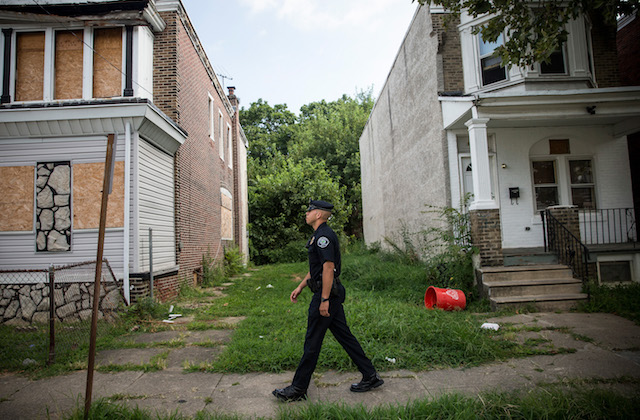On the heels of President Donald Trump signing a welfare reform executive order that critics say will do nothing to help the plight of the nation’s working poor, a new article from The New Republic explores the ways the United States criminalizes people caught in the net of poverty.
Published yesterday (April 10), Peter Edelman’s “More Than a Nuisance” chronicles widespread policies and practices that lead to one place: “the poor are often punished simply because they are poor, and especially if they are people of color.” Edelman writes:
Low-income children are arrested for minor schoolyard scuffles instead of being sent to the principal’s office. Recipients of public benefits are charged with fraud because they made mistakes filling out government forms. Cities use vagrancy laws to banish the homeless. And in an estimated 2,000 local municipalities across 44 states, police can order landlords to evict people they consider “chronic nuisances” because they rack up a certain number of petty infractions as small as forgetting to cut their grass, leaving garbage out on their property, or having practically any arrest on their record.
He shares the story of Lakisha Briggs as an example of the impact these laws have on families:
Take Lakisha Briggs, a certified nurse’s assistant in Norristown, Pennsylvania. In 2012, Norristown classified anyone who called 911 three times in four months a “nuisance.” In April of that year, after several 911 calls, the police came to arrest Briggs’s abusive boyfriend, but they warned her that if she called again she and her daughter would be evicted; even calls from concerned neighbors would count against her. Later, when her former boyfriend returned from prison, he continued the abuse. “I had no choice but to let him stay,” she told a reporter. That June, when he knocked her unconscious and stabbed her in the neck with a shard of glass from a shattered ashtray, she still refused to call the police and ended up wandering outside until someone saw her and called a trauma team to medevac her to a nearby hospital. A few days later, she was evicted.
Edelman also delves into the underlying racial dynamics at play:
Race is at the heart of this issue, as it is for so many things in this country. Maplewood, Missouri’s housing ordinances—which allow the police not only to label people “nuisances” but to ban them from living anywhere within the city limits for up to six months—are disproportionately invoked against African Americans. Rosetta Watson, for example, a 53-year-old African-American woman with disabilities, was kicked out of the city in 2012 after she called 911 four times (she’d been punched, shoved and choked by her boyfriend). Between 2010 and 2015, at least 44 percent of people evicted from Maplewood were African American—this in a city that is just 17 percent Black.
Read the full article here.
